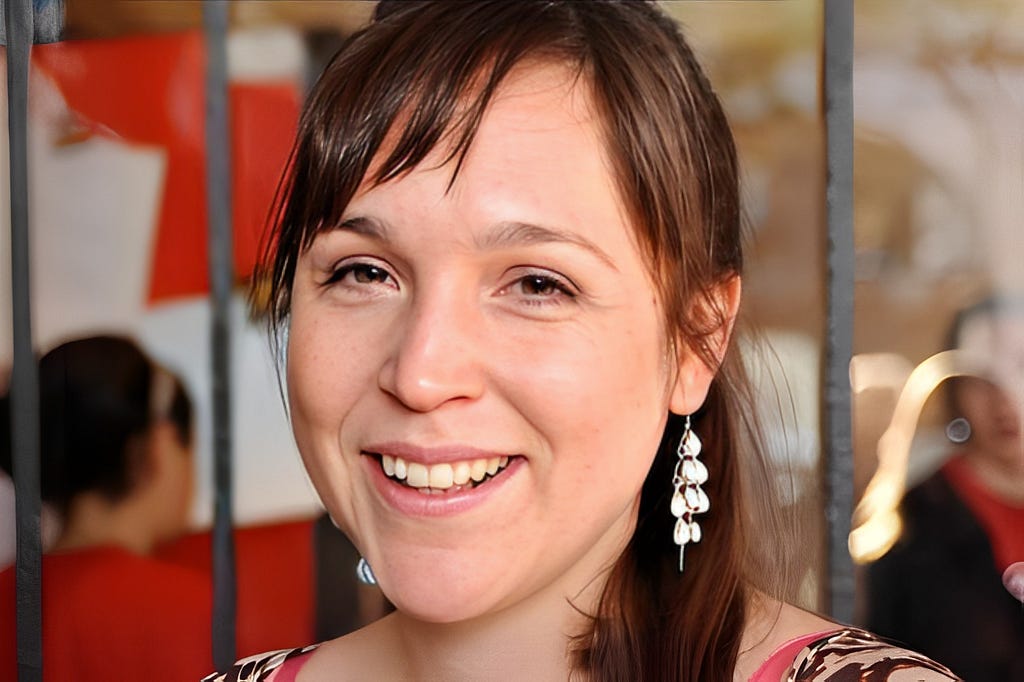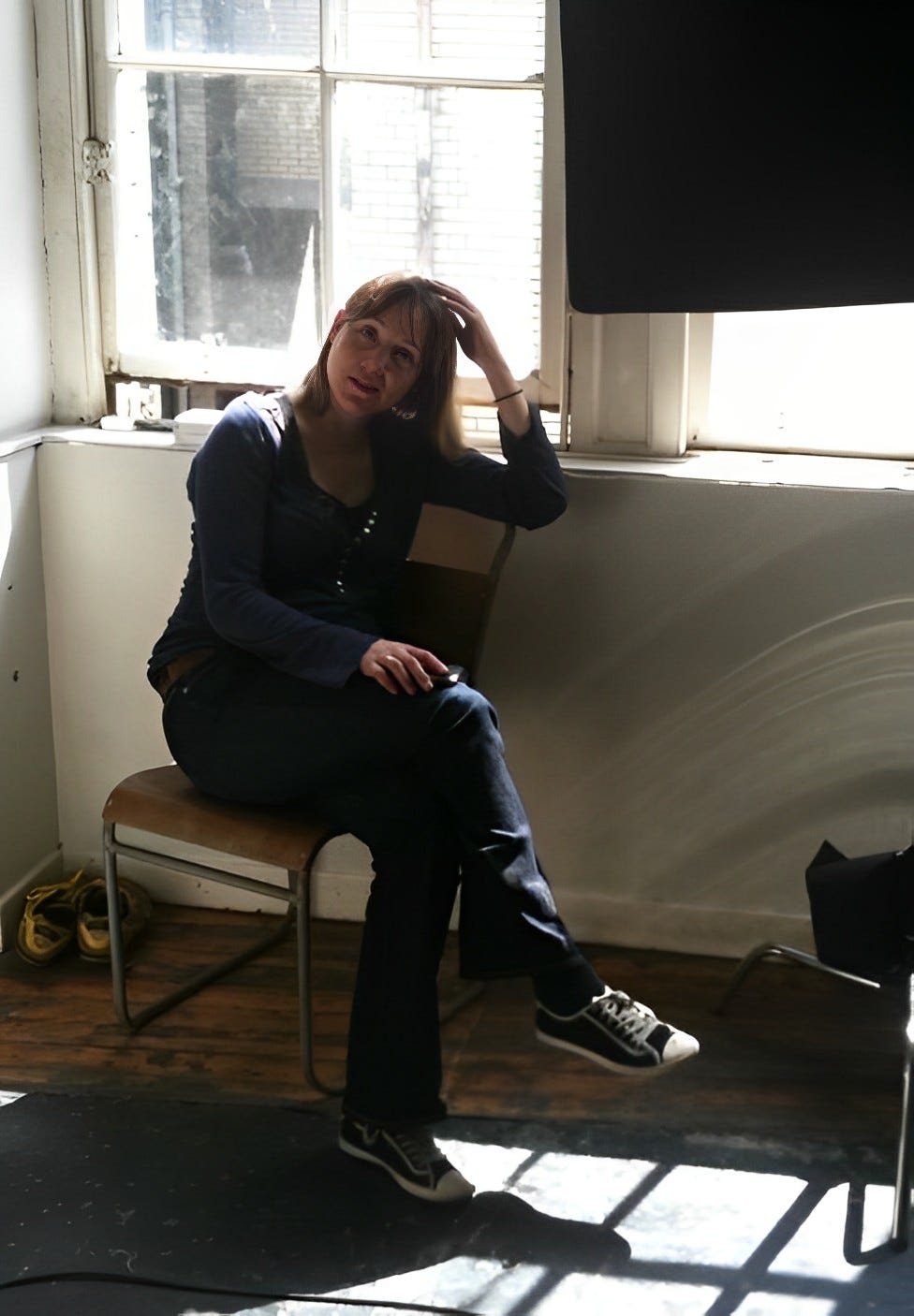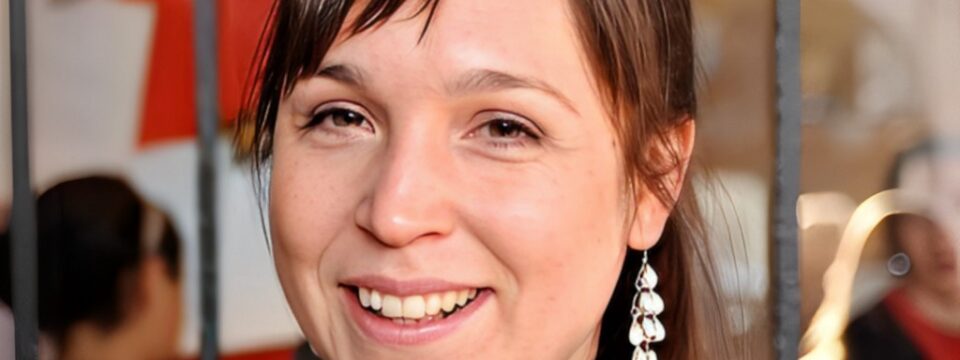
Keep going. That’s all of film-making. All these people who appear to have been born with a camera in one hand and a script in the other — 99% of them have had a massive headstart in life and their film-making careers which I didn’t even become aware of until my thirties.
As a part of our series called “5 Things I Wish Someone Told Me When I First Became A Filmmaker”, I had the distinct pleasure of interviewing Annalise Davis — The choice of VP was entirely driven by the story and characters.
We had developed the script as a ‘traditional’ short film, then because of its claustrophobic enclosed setting we initially started exploring VR and AR as a way of opening out the idea; we experimented with the concept of an MI6 Ops Room being ‘visited’ by the AR figures of the people they are so casually considering killing.
Then we met the team at Dimension, and with the technological advancements of VP, we realised we could go back to telling the story as a ‘traditional’ short film, but use VP to enhance and expand these two worlds and how they collide.
Thank you so much for joining us in this interview series! Our readers would love to get to know you a bit better. Can you tell us a bit of the ‘backstory’ of how you grew up?
My parents met in Tanzania (where my mum was from) and travelled a lot, so my early childhood was spent in Kuwait and Sri Lanka. I went to secondary school in the UK then university in New Zealand. I find answering the question ‘where are you from’ very hard so how I grew up is much easier!
I didn’t have any kind of connection to the film industry, but I loved watching films — classic Hollywood films when I was young (‘Twelve Angry Men’, ‘Butch Cassidy and the Sundance Kid’ as well as musicals), and then my tastes expanded when I studied film at university. But I didn’t understand that I could go into film-making as a job (because it wasn’t a job people like me even knew about, let alone considered as an option), and I had no idea what film producers did.
We talk about the privilege of nepotism and private school education (neither of which I had) that help people break into the film industry; but there’s an even more fundamental issue around any — let’s say ‘normal’ kid — wanting to go into the creative industries. If you don’t have family members or other role models telling you how these industries work, or how important the act of thinking, emotional authenticity and the iterative process is for any creative medium, these industries and their practices are like a foreign land. One ends up believing in the rhetoric of talented misunderstood geniuses or overnight successes without understanding the hard work, experimentation and willingness to fail that is involved in any ‘success’ stories.
Can you share a story with us about what brought you to this specific career path?
I fell into it. I didn’t know film producing was a job. What I did know was that I loved my undergraduate degree (I double majored in Film and Philosophy) and wanted to do a masters in one of them. Philosophy felt too separate from the real world, so I applied to the National Film and Television School to do a Masters in Producing. I got in and from there I figured out what a producer does. I had to pretend to knew to get in, but really I had no clue.
Can you share the funniest or most interesting story that occurred to you in the course of your filmmaking career?
Obviously the funniest stories are on some level not repeatable in print.
I don’t think I can say who told me this, but I was once pondering how one answers the question ‘how was xxxx like to work with’ when they were a nightmare. You don’t want to be unkind, or even openly criticise someone (for all you know they were lovely with the next person), but at the same time, you can’t gush. Here are the three lines that will get you out of this hole with elegance and speed:
Nice guy.
Bit tricky.
Life’s too short.
Who are some of the most interesting people you have interacted with? What was that like? Do you have any stories?
Nik Powell. He unfortunately died a few years ago but he was the head of the National Film and Television School when I studied there, and he taught me so much –
The importance of engaging with everyone and giving everyone a chance. Always knowing what the main purpose of every meeting is. On time is late. That there is no such thing as an ‘overnight success’, they’ve always been slogging away for years before that happens. Leading by example by being so generous with his time, energy and brain. Always wait for the other person to offer you a drink in a meeting at a Cannes hotel, as they’re so expensive.
To name a few.
I’m also doing a film with director Michael Hoffman and he is not only a fantastic director and writer, but more importantly — his Hollywood stories make me cry with laughter.
None of us are able to achieve success without some help along the way. Is there a particular person who you are grateful towards who helped get you to where you are? Can you share a story about that?
Andy Paterson has mentored me from the start of my career and evolved into a valued colleague and trusted friend. He is an immensely generous human being, who has always been available at the other end of a phone line or email to help with advice and support.

Can you please give us your favorite “Life Lesson Quote”? Can you share how that was relevant to you in your life?
I taught at the National Film and Television School and loved it, because of its energy, and you end up learning so much from the students and other teachers. One thing a student said has stayed with me, as it was about film’s power to inform and educate. She said: ‘Films don’t change the world, but people who watch them do.’
I try to always make films using that philosophy, alongside my desire to always make films that ENTERTAIN. A fun film with an underlying message smuggled in is so much more powerful than a worthy film which beats you over the head with its morality.
I am very interested in diversity in the entertainment industry. Can you share three reasons with our readers about why you think it’s important to have diversity represented in film and television? How can that potentially affect our culture?
See above regarding my background and how aware I am of the invisible and visible barriers to the film industry that still exist. If we want to make films about a variety of stories featuring people from different backgrounds with different life experiences then it stands to reason that’s what our industry should be made up of. It has to be done with integrity and intention though — there’s a danger that we can tick boxes on diversity but still manage to find — as an example — people of colour who are rich and went to Eton. Which only half way gets the point.
But mainly — nobody wants to be a BORE and if you make films using the same types of people they will inevitably be boring to everyone but those specific types of people who make them.
As a side bar — I am in a what’s app group called ‘The Comps’ which consists of my friends from the film industry who went to a comp school. There are three people in it.
What are some of the most interesting or exciting projects you are working on now?
I’m in post-production on a female led survival thriller with Altitude Films which has been great fun to make, I’ve worked with amazing people, and I’m super-excited about how it is shaping up. It’s a genre film with a truly diverse cast, led by a young black woman whose character is strong, vulnerable, inspirational and doesn’t die within the first ten minutes. I’m excited about that.
Then I have a feature film, ‘Burn It Down’, with the same team from ‘Fireworks’ (Steven Lally and Paul Franklin) which is a female led action thriller set in a South American jungle — again, as with ‘Fireworks’ we will use cutting edge Virtual Production to tell our story.
I like films with female leads.
Which aspect of your work makes you most proud? Can you explain or give a story?
I’m proud of the work we did on ‘Fireworks’. We made it in the height of the second lockdown, which had its own challenges.
But more importantly, we all set out to make a film that was entertaining and powerful, that also used brand new technology — Virtual Production — in a way that not only served the story, but also pushed the technology as far as it could go. As our designer Jamie Lapsley said: ‘let’s push it until it breaks, then we can take a step back from that.’ And of course we had double Academy Award winning Paul Franklin directing, who works at that level all the time. The people at Epic (particularly Alistair Thompson and Ben Lumsden) were also crucial in supporting our collective ambition (or madness, depending on your point of view).
In a wider sense, I love that the film industry means I get to work with smart, curious and ever-evolving people with whom I have constructive and collaborative relationships. And I am proud of telling stories that are female driven whilst still being entertaining and engaging.
Ok super. Here is the main question of our interview. What are your “5 things I wish someone told me when I first started” and why. Please share a story or example for each.
- Keep going. That’s all of film-making. All these people who appear to have been born with a camera in one hand and a script in the other — 99% of them have had a massive headstart in life and their film-making careers which I didn’t even become aware of until my thirties.
- Life’s too short to work with arseholes. Or — to put it another way — if someone presents hard one way (eg ‘I’m a really moral person’), chances are, the opposite is true of them.
- All good art is about finding the emotional truth at the heart of a character, scene, piece of dialogue or action. If you can find that emotional truth within yourself, you can translate it onto the screen.
- Theme is everything.
When you create a film, which stakeholders have the greatest impact on the artistic and cinematic choices you make? Is it the viewers, the critics, the financiers, or your own personal artistic vision? Can you share a story with us or give an example about what you mean?
This sounds horribly pretentious but art and cinema is all about finding an emotional truth and sticking with it. This informs the theme which informs every single choice you make. Your job as the producer is to find the intention of the story — working with the writer and director — and to ensure that all the decisions feed into this intention. All the notes and feedback you receive can be shaped around this controlling idea and thought. The trick is to do this whilst remaining open, flexible and curious.
Film-making is the most magical thing in the world because it takes so much energy and curiosity — you have to constantly evolve and be alive to everyone and everything around you, and everyone who makes films has that same energy and curiosity.
(I’m not saying I succeed at any of the above, of course!).
You are a person of great influence. If you could start a movement that would bring the most amount of good to the most amount of people, what would that be? You never know what your idea can trigger. 🙂
That’s a no brainer — meaningful policy changes around climate breakdown that every country in the world takes on. Kate Raworth’s doughnut economics is a good start.
We are very blessed that some of the biggest names in Business, VC funding, Sports, and Entertainment read this column. Is there a person in the world, or in the US whom you would love to have a private breakfast or lunch with, and why? He or she might see this. 🙂
Yes! Somebody who is interested in working with a film-making team who can harness the burgeoning potential of Virtual Production to tell engaging and entertaining cinematic stories!
How can our readers further follow you online?
I’m on twitter (for now?) annalise_davis, plus my website is www.wilder-films.com
This was very meaningful, thank you so much! We wish you continued success!
Annalise Davis of FIREWORKS: 5 Things I Wish Someone Told Me When I First Became A Filmmaker was originally published in Authority Magazine on Medium, where people are continuing the conversation by highlighting and responding to this story.
